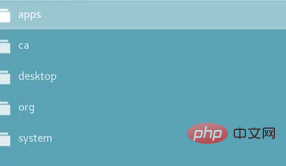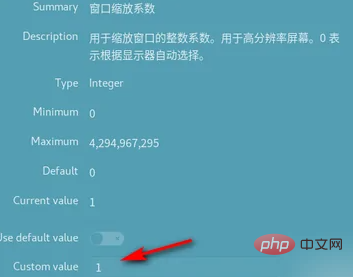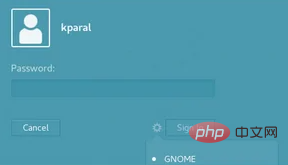
In Linux, gdm is a graphical interface, a program that manages the graphics display server and handles graphical user login; gdm is used to replace the original "X Display Manager" and is completely rewritten and does not contain any XDM code can run and manage local and remote X servers.

#The operating environment of this tutorial: linux7.3 system, Dell G3 computer.
gdm is the graphical interface of Linux
GDM (The GNOME Display Manager) is the manager of the GNOME display environment. And is used to replace the original X Display Manager. Unlike its competitors (X3DM, KDM, WDM), GDM is completely rewritten and does not contain any XDM code.
GDM can run and manage local and remote X servers (via XDMCP). gdm is just a script that actually runs the GDM binary executable file. gdm-stop is a script used to quickly terminate the currently running gdm daemon process.
The gdm-restart script will quickly restart the current daemon process. However, gdm-safe-restart will restart after everyone has logged out. gdmsetup is a graphical interface tool that can easily modify most commonly used options.
GDM is a program that manages the graphical display server and handles graphical user login."
Expand knowledge
The operation method is as follows;
1. First modify the GNOME interface scaling level coefficient, set the scaling value of the window, open gnome-tweak-tool to view the scaling value scale of the window, adjust the scaling parameter value, first adjust the window scaling value to 1 to see the effect.

2. If the effect is satisfactory, there is no need to modify it. If the screen display is still large after adjustment, adjust the value to 2. If there is no change, you need to use it. Use the gsettings command to view the scale value.

3. Then use the command to execute and adjust the value to 1. The current zoom level is actually 2 values instead of 1 values. Use the figure as shown Use the command to make changes and adjustments.

4. Then configure the x service access permissions and open the dconf tool for direct modification.

5. Then start the dconf interface, follow the path /org/gnome/desktop/gnome/interface to enter the setting screen scaling interface, pull down the scroll bar to find the scaling-factor option and modify its parameter value to 1.

6. Finally, restart the system and check the login interface of the high-resolution screen. At this time, the interface will be repaired and displayed normally.

Recommended learning: Linux video tutorial
The above is the detailed content of What is gdm in linux. For more information, please follow other related articles on the PHP Chinese website!